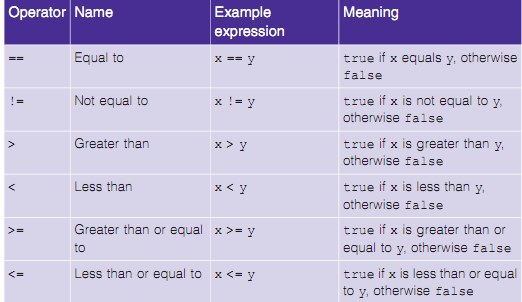Relational operators:
The relational operators tell you about relationships between values of the same type. Their arguments can be integers, floating-point numbers, or characters. The 'equal to' and 'not equal to' operators can also be used with the boolean type.
The operators are summarized in Table. Notice especially that the equality operator is two equals signs, one after the other. It is easy to forget to type one of these signs, which changes the meaning of the expression to an assignment.

An expression involving a relational operator is a logical expression, so has a boolean value. The following expressions would all evaluate to true:
1 < 2
0.5 > 0.0
true != false
false == false
2 == 2
'a' < 'c'
Arguments of relational operators can also be expressions. For example, if the values of the variables a, b and c were 34, 56 and 3 respectively, then the value of:
(a + b) < c
would be false and the value of the expression below would be true:
(a + 81) == ((b * 2) + c)
Java Assignment Help - Java Homework Help
Struggling with java programming language? Are you not finding solution for your Relational operators homework and assignments? Live Relational operators experts are working for students by solving their doubts & questions during their course studies and training program. We at Expertsmind.com offer Relational operators homework help, java assignment help and Relational operators projects help anytime from anywhere for 24x7 hours. Computer science programming assignments help making life easy for students.
Why Expertsmind for assignment help
- Higher degree holder and experienced experts network
- Punctuality and responsibility of work
- Quality solution with 100% plagiarism free answers
- Time on Delivery
- Privacy of information and details
- Excellence in solving java programming language queries in excels and word format.
- Best tutoring assistance 24x7 hours